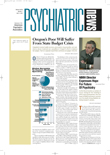Juveniles are often transferred to adult court to stand trial for serious crimes. A new study shows, however, that they are less likely than adults to understand the legal process, have good decision-making skills, and form an accurate assessment of their legal situation.
The study was released last month by the MacArthur Research Network on Adolescent Development and Juvenile Justice, which conducted the study. The results will be published in an upcoming issue of the journal Law and Human Behavior.
Moreover, adolescents below the age of 15 are less likely than adults to recognize the risks inherent in their legal decisions or consider the long-term consequences of those choices, according to clinical psychologist Thomas Grisso, Ph.D., the lead researcher and a professor of psychiatry and coordinator of the psychiatry and law program at the University of Massachusetts Medical School in Worcester.
“We found that younger juveniles had difficulty with abstract reasoning including having an accurate perspective of time, Grisso told Psychiatric News. “For example, a defense attorney asked a young client whether he understood what ‘being put away for a long time’ meant. The client responded, ‘It’s like being sent to my room for a weekend.’ ”
Grisso is one of the winners of 2000 and 2002 Manfred S. Guttmacher Award, cosponsored by APA and the American Academy of Psychiatry and the Law.
Purpose and Sample
The purpose of the study “was to learn about the abilities of youths as defendants in their trials,” said Grisso. The researchers evaluated their ability to understand their trials, assist their attorneys, and make decisions in the trial process, which are abilities the law requires for defendants to be competent to stand trial.
The researchers also evaluated the youth’s decision making as defendants and the explanations for their choices using several dimensions of psychosocial maturity. The psychosocial dimensions looked at whether an individual considered future events or consequences in everyday life, recognized and evaluated the risks in potentially harmful or dangerous activities, and resisted peer influence.
The sample was made up of approximately 1,400 male and female adolescents aged 11 to 17 and adults aged 18 to 24 in Los Angeles, Philadelphia, Northern and Eastern Virginia, and Northern Florida. Half the participants were in jail or detained in juvenile detention centers, and the other half lived in the community and had little or no involvement with the juvenile justice system. The participants were matched by age, gender, ethnicity, and social class.
The results showed that adolescents aged 11 to 14 were three times more likely to have trouble understanding the legal process and applying sound reasoning to their legal decisions than older adolescents and adults.
Detained juveniles and adults had lower intelligence scores than the community sample. “Because a greater proportion of adolescents in the juvenile justice system had below-average intelligence than [those] in the community, the risk for incompetence to stand trial is even greater among adolescents in the juvenile justice community,” said Grisso.
Juvenile detainees also had higher rates of alcohol and drug use, anger, depression or anxiety, somatic complaints, suicidal ideation, and thought disturbances than youth in the community. Juveniles were also more likely than adults to comply with the wishes of authority figures, such as confessing to a crime when interrogated by police officers or accepting a prosecutor’s offer of a plea bargain, said Grisso.
Study Implications
Louis Kraus, M.D., chair of APA’s Committee on Juvenile Justice Issues, told Psychiatric News, “I have heard of police officers telling younger juveniles that if they confessed to committing a crime, they could go home that night. I have found that younger juveniles can become highly anxious when confronted with their actions and are unable to communicate as clearly as under normal circumstances.”
Grisso said, “The findings have legal and practice implications. States that allow juveniles below age 15 to be transferred to adult criminal court to stand trial for serious crimes such as murder might consider raising the lower age limit to 15 or requiring a determination of the youth’s competence to stand trial before allowing a transfer to adult criminal court. We also recommend that defense attorneys spend more time with their clients instructing them about the legal process.”
The study did not assess dangerousness or likelihood of rehabilitation, two common criteria used to decide whether individuals should be tried in adult or juvenile court, according to Grisso.
The study, “Juveniles’ Competence to Stand Trial: A Comparison of Adolescents’ and Adults’ Capacities as Trial Defendants,” is posted on the Web at www.mac-adoldev-juvjustice.org/. ▪
